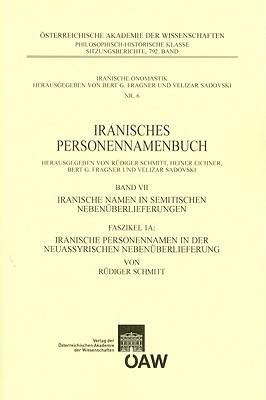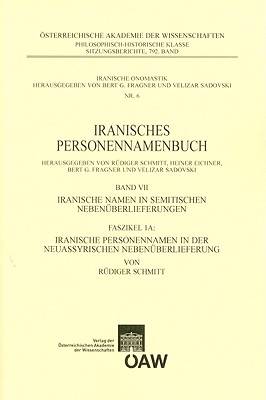
- Retrait gratuit dans votre magasin Club
- 7.000.000 titres dans notre catalogue
- Payer en toute sécurité
- Toujours un magasin près de chez vous
- Retrait gratuit dans votre magasin Club
- 7.000.0000 titres dans notre catalogue
- Payer en toute sécurité
- Toujours un magasin près de chez vous
Iranisches Personennamenbuch Band VII
Iranische Namen in Semitischen Nebenuberlieferungen: Faszikel 1a: Iranische Personennamen in Der Neuassyrischen Nebenuberlieferung
Rudiger Schmitt
Livre broché | Allemand
56,45 €
+ 112 points
Description
English summary: This volume of the Iranisches Personennamenbuch (Lexicon of Iranian personal names) presents a full collection and detailed interpretation of those anthroponyms attested in 9th 7th c. Neo-Assyrian texts (annals, reports on military campaigns, oracle inquiries, letters etc.), which certainly or quite probably are of Iranian origin; but it takes into account those names too, which are reminiscent of Iranian names and previously were explained as Iranian by mistake, and those, which are latent in toponyms containing them. The collection itself is based on the five instalments of the Prosopography of the Neo-Assyrian Empire (Helsinki 1998ff.) and the material gathered for it. It was under Assurnasirpal II and Salmanassar III (9th c. BC) that the Assyrians for the first time had come into direct contact with Iranian, esp. Median, tribes, whom they partly could subjugate and at times could lay under tribute. Thus the anthroponyms of Iranian origin mainly belong to the Median dialect. The 178 names are presented according to the model of the earlier volumes of the Iranisches Personennamenbuch: The full listing of the references is followed by a prosopographical sketch of the person(s) bearing the name in question; the major part is the discussion of the etymological interpretation of the name. This often must be rather detailed in view of the conflicting opinions and the unreliability of many interpretations. Full indexes make the words and names accessible that are quoted by way of comparison. German description: Der vorliegende Band bietet eine vollstandige Sammlung und eingehende Interpretation jener in neuassyrischen Texten (Annalen, Feldzugsberichten, Orakelanfragen, Briefen usw.) des 9. bis 7. Jh.s uberlieferten Personennamen, die sicher oder sehr wahrscheinlich iranischen Ursprungs sind; berucksichtigt sind aber auch die Namen, die an iranische Namen anklingen und von Fruheren zu Unrecht als iranisch erklart wurden, sowie solche, die in toponomastischen Ableitungen verborgen sind. Die Basis der Sammlung sind die 5 Bande (Helsinki 1998ff.) und die Materialien der "Prosopography of the Neo-Assyrian Empire". Die Assyrier waren unter Assurnasirpal II. und Salmanassar III. im 9. Jh. v.Chr. erstmals mit iranischen, v.a. medischen, Stammen in direkten Kontakt gekommen, die sie zum Teil unterwerfen und sich zeitweise tributpflichtig machen konnten. Die Namen iranischer Herkunft stammen also vorwiegend aus dem Medischen. Die Prasentation der 178 Namen erfolgt wie in den fruher erschie nenen Banden des "Iranischen Personennamenbuches" Auf die vollstandigen Belegstellenangaben folgt eine prosopographische Skizzierung der Namenstrager; den Hauptteil bilden dann jeweils die Abschnitte uber die Deutung des Namens. In Anbetracht der oft kontroversen Forschung und der Unsicherheit vieler Interpretationen erwies sich eine ausfuhrliche Diskussion haufig als unerlasslich. Detaillierte Register erschliessen das Vergleichsmaterial, das dabei zur Sprache kommt.
Spécifications
Parties prenantes
- Auteur(s) :
- Editeur:
Contenu
- Nombre de pages :
- 214
- Langue:
- Allemand
Caractéristiques
- EAN:
- 9783700166085
- Date de parution :
- 01-12-09
- Format:
- Livre broché
- Format numérique:
- Trade paperback (VS)
- Dimensions :
- 150 mm x 239 mm
- Poids :
- 311 g

Les avis
Nous publions uniquement les avis qui respectent les conditions requises. Consultez nos conditions pour les avis.






